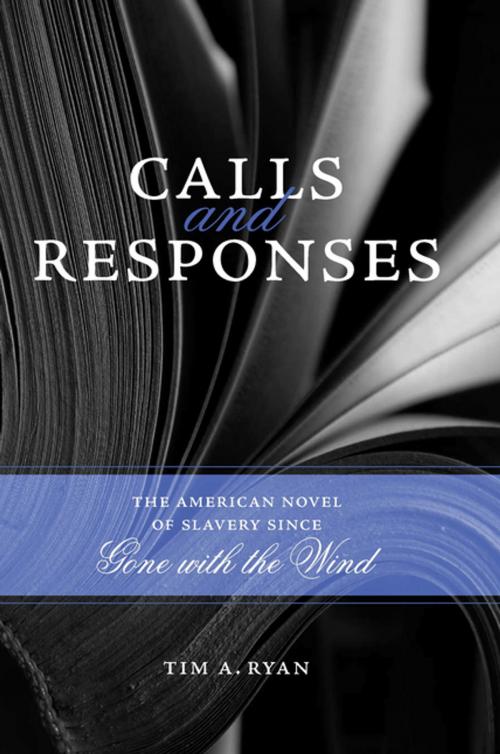Calls and Responses
The American Novel of Slavery since Gone with the Wind
Fiction & Literature, Literary Theory & Criticism, Black, Nonfiction, History, Reference, Historiography, American| Author: | Tim A. Ryan | ISBN: | 9780807148709 |
| Publisher: | LSU Press | Publication: | June 1, 2008 |
| Imprint: | LSU Press | Language: | English |
| Author: | Tim A. Ryan |
| ISBN: | 9780807148709 |
| Publisher: | LSU Press |
| Publication: | June 1, 2008 |
| Imprint: | LSU Press |
| Language: | English |
In this comprehensive, groundbreaking study, Tim A. Ryan explores how American novelists since World War I have imagined the institution of slavery and the experience of those involved in it. Complicating the common assumption that authentic black-authored fiction about slavery is starkly opposed to the traditional, racist fiction (and history) created by whites, Ryan suggests that discourses about American slavery are -- and have always been -- defined by connections rather than disjunctions. Ryan contends that African American writers didn't merely reject and move beyond traditional portrayals of the black past but rather actively engaged in a dynamic dialogue with white-authored versions of slavery and existing historiographical debates. The result is an ongoing cultural conversation that transcends both racial and disciplinary boundaries and is akin to the call-and-response style of African American gospel music.
Ryan addresses in detail more than a dozen major American novels of slavery, from the first significant modern fiction about the institution -- Margaret Mitchell's Gone with the Wind and Arna Bontemps's Black Thunder (both published in 1936) -- to recent noteworthy novels on the topic -- Edward P. Jones's The Known World and Valerie Martin's Property (both published in 2003). His insistence upon the necessity of interpreting novels about the past directly in relation to specific historical scholarship makes Calls and Responses especially compelling. He reads Toni Morrison's Beloved not in opposition to a monolithic orthodoxy about slavery but in relation to specific arguments of controversial historian Stanley Elkins. Similarly, he analyzes William Styron's The Confessions of Nat Turner in terms of its rhetorical echoes of Frederick Douglass's famous autobiographical narrative. Ryan shows throughout Calls and Responses how a variety of novelists -- including Alex Haley, Octavia Butler, Ishmael Reed, Margaret Walker, and Frances Gaither -- engage in a dynamic debate with each other and with such historians as Herbert Aptheker, Charles Joyner, Eugene and Elizabeth Genovese, and many others.
A substantially new account of the development of American slavery fiction in the last century, Calls and Responses goes beyond merely exalting the expression of black voices and experiences and actually reconfigures the existing view of the American novel of slavery.
In this comprehensive, groundbreaking study, Tim A. Ryan explores how American novelists since World War I have imagined the institution of slavery and the experience of those involved in it. Complicating the common assumption that authentic black-authored fiction about slavery is starkly opposed to the traditional, racist fiction (and history) created by whites, Ryan suggests that discourses about American slavery are -- and have always been -- defined by connections rather than disjunctions. Ryan contends that African American writers didn't merely reject and move beyond traditional portrayals of the black past but rather actively engaged in a dynamic dialogue with white-authored versions of slavery and existing historiographical debates. The result is an ongoing cultural conversation that transcends both racial and disciplinary boundaries and is akin to the call-and-response style of African American gospel music.
Ryan addresses in detail more than a dozen major American novels of slavery, from the first significant modern fiction about the institution -- Margaret Mitchell's Gone with the Wind and Arna Bontemps's Black Thunder (both published in 1936) -- to recent noteworthy novels on the topic -- Edward P. Jones's The Known World and Valerie Martin's Property (both published in 2003). His insistence upon the necessity of interpreting novels about the past directly in relation to specific historical scholarship makes Calls and Responses especially compelling. He reads Toni Morrison's Beloved not in opposition to a monolithic orthodoxy about slavery but in relation to specific arguments of controversial historian Stanley Elkins. Similarly, he analyzes William Styron's The Confessions of Nat Turner in terms of its rhetorical echoes of Frederick Douglass's famous autobiographical narrative. Ryan shows throughout Calls and Responses how a variety of novelists -- including Alex Haley, Octavia Butler, Ishmael Reed, Margaret Walker, and Frances Gaither -- engage in a dynamic debate with each other and with such historians as Herbert Aptheker, Charles Joyner, Eugene and Elizabeth Genovese, and many others.
A substantially new account of the development of American slavery fiction in the last century, Calls and Responses goes beyond merely exalting the expression of black voices and experiences and actually reconfigures the existing view of the American novel of slavery.















